END OF TERM CONCERTS AND REPORTS + bits and pieces
END OF TERM CONCERTS AND REPORTS + bits and pieces
by Norman Warwick
Try to keep up, please, because its all about the timing. There´s CACT and there´s CIEM and you musn´t forget, even though I have forgotten, what is the acronym for The Canary Islands International Music Festival. It doesn´t help clarification I suppose when people like me turn acronyms into cryptic clues by accidentally re-arranging their letters each time I refer to them in article.

To discover the art, culture and tourism Centres of Lanzarote you would do well to remember CACT, which is a slight rearrangement of the first letters of art, culture and tourism centres of Lanzarote.
A visit to Lanzarote offers memorable live experiences. The singular visión of Cesar Manrique offers the possibility to enjoy this unique place where art and nature co-exist in perfect harmony.(left)
The ideology behind CACT was perhaps best explained by Kim Edwards-Barque in a text of September 2019 that still remains on line and high on search engine findings almost three years later.
The author wrote that ´a visit to Lanzarote is so much more than sunshine and sand (although they’re always welcome!). Add this to spectacular unspoilt scenery, traditional towns and villages, delicious local food and wine, and cultural and artistic attractions and events, and you’ve got a perfect holiday for culture freaks and history buffs.
Panoramic viewpoints, art galleries, castles, live music, dance, folklore and traditional culture: All this on a laid-back island of only 805 sq. km that’s easy to get around at a stress-free pace. Read on for inside information on the best cultural attractions in Lanzarote.
César Manrique (1919-1992) was a Lanzarote-born artist who shaped tourism on the island as we know it. He was way ahead of his time and true pioneer of sustainable tourism as early as the 1960s, when the term was relatively unknown. He tirelessly defended his island’s natural assets and worked together with the government to develop the island’s natural and cultural treasures.
You’ll see Manrique’s stamp all over. Wind and artistic sculptures adorn many of the island’s roundabouts. Lanzarote’s houses must be painted white, with wooden frames in either blue, green or brown, depending on whether they are coastal or rural.
He built his original house the Taro de Tahiche, in 1968 and it is now the César Manrique Foundation. It is built around five volcanic bubbles and is a true example of his style and commitment to blending art and nature in perfect harmony. This design concept was so avant-garde at the time that it attracted architects from all over the world.
He spent his later years in his home in the picturesque town of Haría. The César Manrique House Museum is a glimpse of Manrique’s personal side and is also a must-see on your list of cultural attractions in Lanzarote.
Manrique’s most impressive contribution to his island is perhaps his work with the island’s tourist centres, transforming them into places that tourists could enjoy whilst also ensuring their conservation.
The artist maintained his colour palette throughout: the blue of the ocean, the blacks, oranges and reds of volcanoes, the green vegetation and the pristine white-washed walls of island architecture.
When Volcán de la Corona erupted 21,000 years ago, it created the Tunnel of Atlantis, a 7 km-long tunnel that extends under the sea. Two of Lanzarote’s most magnificent natural attractions are located inside this tunnel: Cueva de los Verdes and Jameos del Agua
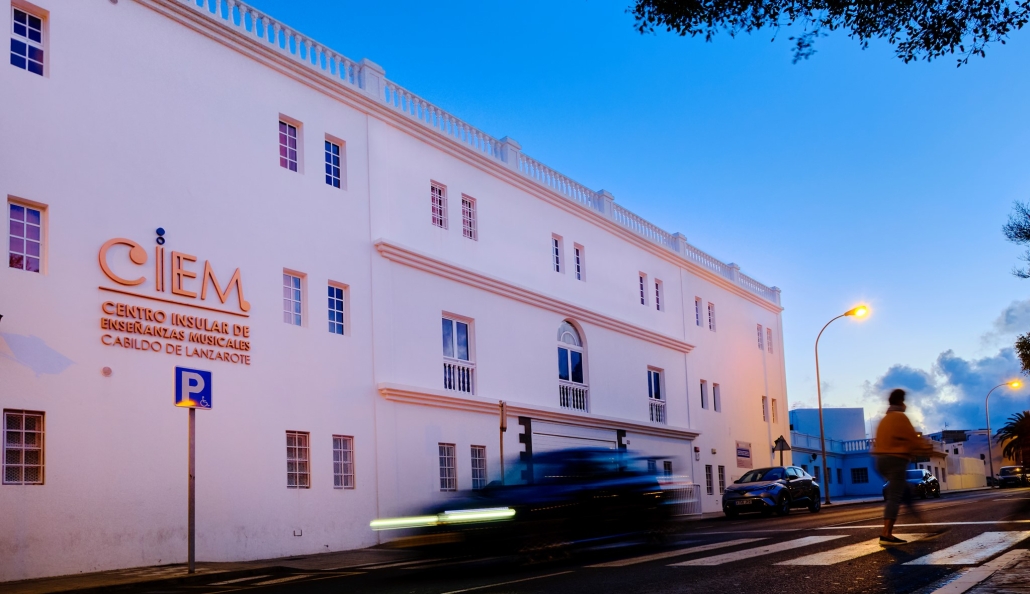
The CIEM is the Insular Center for Musical Teaching of Lanzarote, an educational center dependent on the Department of Culture of the Cabildo de Lanzarote
In 1992, the Cabildo de Lanzarote promoted the creation of a music teaching centre that would allow the island population access to learning this artistic discipline. A few years later, the appropriate authorizations were obtained for the implementation of an Insular School of Music and an Elementary Conservatory, which are grouped today under the name of CIEM, Insular Center for Musical Teaching of Lanzarote.
In the cenrer, the students share their love for music and their desire to learn, being able to choose between two itineraries, that of the School in training aimed at amateurs with different expressions such as modern music, jazz, classical, etc., with a special attention to the musical practice in group, and on the other hand, the regulated education of the Conservatory, which is subject to the guidelines of the State and the Canary Islands Ministry of Education.
The center opens its doors every year to new registrations for all instruments, with the youngest being able to start in Music and Movement classes, starting at 5 years of age.
The groups are a fundamental part in the musical training of the students of the Insular Centre for Musical Teaching of Lanzarote.
The three bands that the centre has this year are comprised of boys and girls from the age of nine and I´m sure they will never forget performing such a concert as this before family and friends in such a wonderful and unique auditorium.
They performed a varied repertoire that included classical and, popular music, from pasodobles and soundtracks.
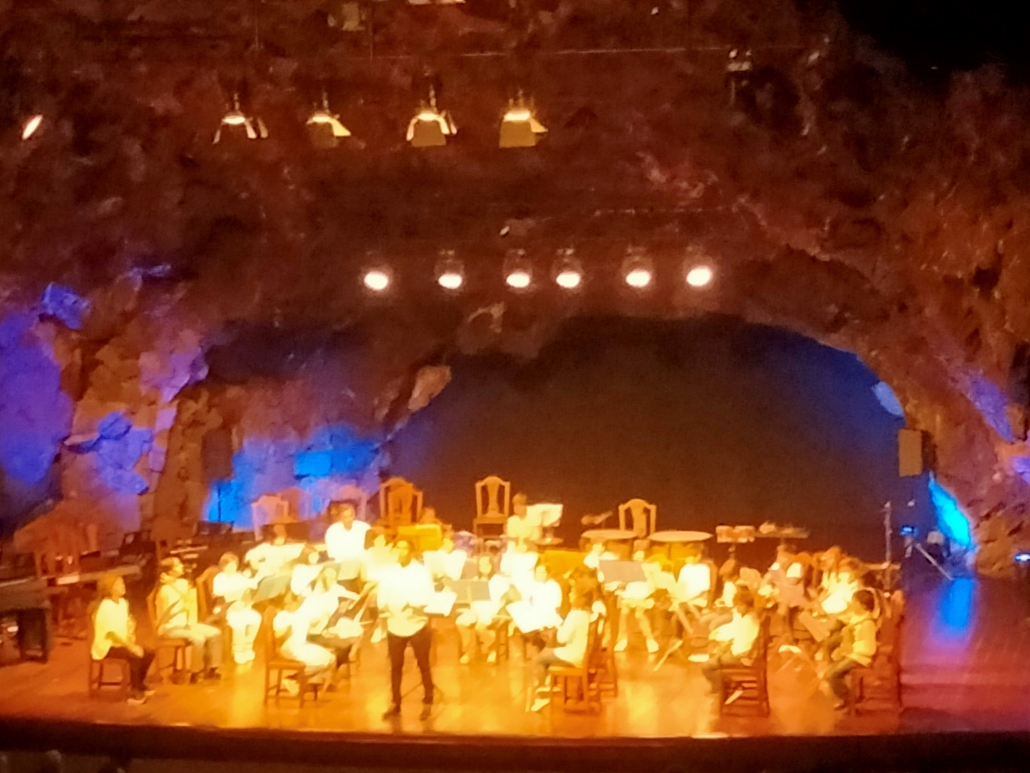
The Beginner Band, (left) with teacher Iván Curbelo Fernández, delivered Where the Sun Breaks Through the Mist (Michael Sweeney), España Cañí (P. Marquina / arr. Robert Longfield), and the Mission Impossible Theme (L. Schifrin / arr. P. Murtha)
The very slight hesitancy from the beginner´s band (a somewhat pejorative title, that should really read as Players Of The Future Band), was only to be expected in such a youthful and new ensemble. What was wonderful to hear, though, was their increasing confidence throughout the repertoire. It was also wonderful to see their sheer joy and pride as the final note faded away of a concert that had clearly shown their love of their instruments and the music they played.
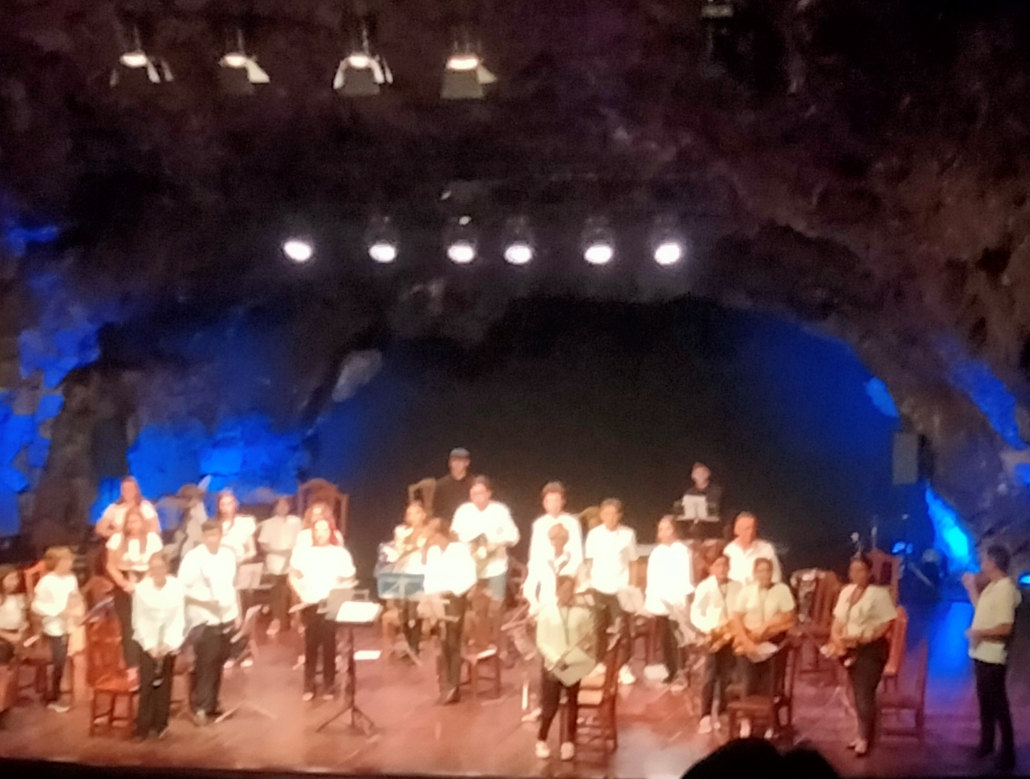
Following this was Intermediate Band (right) with their Teacher, Pablo Blanco Medina, and they gave us the March from second suite for Military Band (G. Holst), the Hungarian Dance no. 7 (J. Brahms),very exciting Legend of Zorro- (Horner / Brown) and Variazioni in blue (Jacob de Haan). Hearing the band in age-order like this gave us all the opportunity to see how quickly ability and confidence improves from one age group to the next. The Intermediate Band brought their individual instruments into0 play more smoothly, of course, and therefore add a bit more dash and verve, and I loved the variations in Blue at the end.
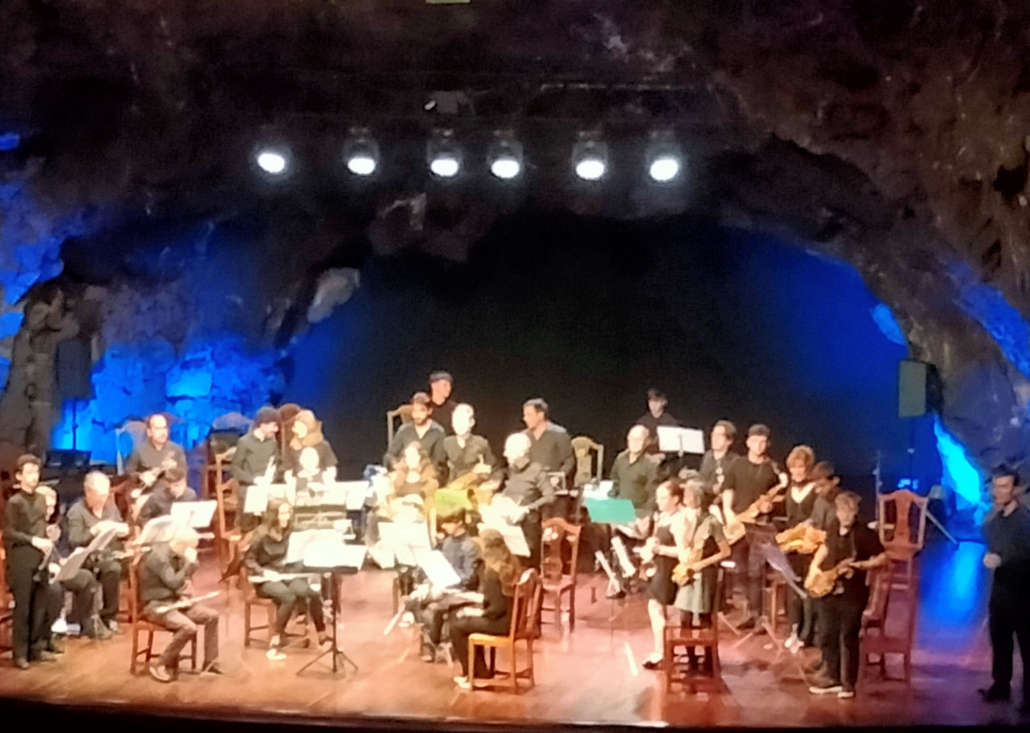
The Advanced Band (left) , led by teacher Salvador Santana Luján gave us an exciting play list of Year Of The Dragon (Michael Sweeney), Hooked on a feeling (Johnie Vinson), Cimarron Overture (M. Williams), Edinburgh Castle (James Pendleton) Stirling Castle (James Pendleton). Again, there was an apparent increased confidence, with even a slash of showmanship, and there was definite professionalism about the performance, of these orchestras that seemed to have no strings attached.
There was to be a repeat performance at the same venue the following evening and an end of year concert scheduled at El Salinero Theatre in Arrecife on 20th June, that would see different ensembles of the students and soloists.
Whether a few, some, many or all of the students we have seen at these concerts will go onto become professionalise players all those who do so will have had the best possible care and preparation shown to them. That the musicians were able to relax and play well with their teachers in attendance and leading them speaks loudly of the rapport between them.
And even if some of those who played here decide not to follow a musical career, they will always have their instrument as a best friend and a love of music to steer them through life.
There was to be a repeat performance at the same venue the following evening in an end of year concert scheduled at El Salinero Theatre in Arrecife on 20th June, that would see different ensembles of the students and soloists.
It turned out that each group was joined by a music bny one, or more, of their music teachers. A young man who was playing what I think was a frugelhorn was accompanied who gave an incredible piano support role. That the boy could make a valid contribution with his own instrument and help deliver an excellent performance in front of peers and friends and family in a noisily supportive audience was terrific.
A highlight was when a group twenty and more of what seemed to be ´primary´ age infants were brought to the stage to stand in front of a six piece orchestra to perform a rhythmic sound accompaniment by stamping their feet, patting their heads, tapping their chests and clapping their hands. This was charming and delightful with a couple of childe almost missing a cue because they were waving to mum and dad, or lost in awe at the stage and the crowd and the noise or trying to distract the person next in line to them. It all worked perfectly, though, and they ran off the stgage and up the aisle through the theatre to rapturous applause on an evening they will never forget.
There was a great performance of Give Peace A Chance by one of the ensembles, and a quite brilliant glockenspiel (or perhaps xylophone) offering, and a solo performance by a male student I would have guessed to be an intermediate and an excellent closing piece by the largest ensemble of the night, which included cello, and acoustic and electric guitars.
Whether a few, some, many or all of the students we have seen at these concerts will go onto become professional players all those who do so will have had the best possible care and preparation shown to them. That the musicians were able to relax and play well with their teachers in attendance and leading them speaks loudly of the rapport between them.
And even if some of those who played here decide not to follow a musical career, they will always have their instrument as a best friend and a love of music to steer them through life in whatever vocation they follow.
Some of those near to embarking on a career might havc been playing some gigs the following day, it being WMD. Now, I know we started with a series of acronyms and here is another.
WMD on 21st June is my personal favourite day of the year being as it is the annual World Music Day.
There’s nothing in the world like the sound of your favourite song coming on, it just gets right into your head and your body and makes you move. Or maybe it takes you on a journey to a faraway place and time, where you languish in a memory of times gone by and people who are no longer present. Some of our favourite songs can lift us up out of depression and worry, and make an otherwise horrible day suddenly seem like it’s not so bad. World Music Day celebrates music in all its forms and the impact it’s had on the world and the human spirit.
Have you ever put on your headphones, hit play on an upbeat tune and waltzed down the street as if you were in a movie? You’re not alone, everybody has done it (they’re just too afraid to admit it!). Music has the ability to lift your spirits even when you don’t feel like getting out of bed that day. Why shouldn’t there be an entire day to celebrate the wonders of music? World Music Day needs to be celebrated far and wide without a doubt! Next time you’re in a bit of a funk, crank up your favourite song (close your curtains) and dance like nobody’s watching. It’s a soul soothing activity that should always be your go to saviour!
When it comes to World Music Day I have to agree with Guy Harvey out of Elbow when he sings ´One day like this a year would see me right´.
The best thing about World Music Day is that it is completely free to celebrate. No matter what kind of music you love you can take part for free and you can get the whole family involved. It is the perfect opportunity to try playing a brand-new instrument or listen to a type of music that you wouldn’t normally have on your playlist.
Every type of musician, whether young, old, new or a seasoned professional can embrace world music day with friends, family and even strangers!
Last year more than one thousand cities all over the world celebrated World Music Day, so why don’t you take this opportunity to do it to? Anybody can make music; it doesn’t matter how good you are. If you are the type of person who sings in the shower, why not use this opportunity to showcase your talents? (but please put some clothes on forst !) Even the most tone deaf people can take this day to sing their hearts out and celebrate the beauty and power of music!
World Music Day originally launched several decades ago in France. In 1982 the Ministry of Culture in France developed a clever idea to celebrate the wonders of music. They wanted free, live music to be available to everybody no matter what their heritage or background. Usually you have to pay for tickets to music festivals, but not with World Music Day!
Music is not only a fantastic creative outlet, but it can also have many health benefits. When you listen to a particular song it can bring back a happy memory or make you feel energized. Studies suggest that listening to music can have a number of positive effects on your health and mental wellbeing. As well as enhancing your performance of exercise, it can also provide a huge amount of comfort. Exercise has also been proven to reduce anxiety and listening to relaxing music can also decrease stress levels. So if you are looking for a mood boosting activity, why not celebrate World Music Day and let all of your troubles rush away from your mind instantly?
Music has existed for as long as mankind has found its voice, and quite possibly before. Every culture of the world has its own form of music, as distinct and unique to its area as language and cuisine. In the western world, we are familiar only with scales, known as the diatonic scale which should be familiar to anyone who took music classes or choir in school. But this is not the only or even the first scale that music can use.
There’s the chromatic scale, which has 12 notes instead of the 7, and the octatonic scale, which has 8 notes, but these are just the beginning. In every part of the world, there are different scales and musical formats used, and these create a form of music that has its own signature. Then when you add in the cultural themes, the variety of instruments, and the forms of voice singing that can go along with it, music is a truly endless adventure. World Music Day celebrates this adventure and those that dare to take it.
The best way to celebrate World Music Day is to spend the day listening to all your old favourites, and if you’re truly feeling adventurous start exploring YouTube for music from different cultures. You can explore Finnish and Hungarian, Italian and Mongolian, and then start digging into folk music. With sources like these, it’s easier than ever to explore the panorama of musical experiences the world has to offer, and you can do it all from the comfort of your own home. Of course, you could always pick up an instrument or start adding your own voice to the choir!
I realise that almost every day on Lanzarote feels like World Music Day with music being heard, on our sidewalks from every restaurant, by buskers at the markets and the fok lofe groups ever-present at ever Saints Day and special occasion (of which it seems there are about 365 per annum.
We try to report on most of such events on these pages and we are already looking forward to hearing In Dulci Jubilo Choir singing at the Camel House in Macher on Friday 24th June in a fund raising event for Ukraine, and to bossa nova music night in the caves and next month a massive folk lore event fromTeguey, a long-established and excellent timple and vocal outfit
Happy Trails, then, and we´ll continue to keep you informed, and If you have a Lanzarote event you´d like to comment on drop me an e mail to normanwarwick55@gmail.com and I will try to include it on these pages, fully attributed. If you need to send me such information in Spanish, that´s ok, I have a mate called Google.
Meanwhile, I should get a t-shirt bearing the legend that Every day is World Music Day with Lanzarote Information, (or ediwmdwli for short !


We are told by Jazz In Reading that The Foyer Jazz Club’ at Leighton Park School is pleased to return following a hiatus during the pandemic.The excellent listings service (whilst we´re playing with acronyms) that is JIR deliver advance notice each motnh of jazz events and news taking place in their area. They are among several providers of such jazz news, and we are grateful to them because they deliver their news in a chronological order that even I can follow and also provide relevant and easy to posts jpeg images of many of the artists included in their lists. They also provide a brief biography that we can save in our archives and refer to in subsequent articles. With theirf contacts at The Progress Theatre and The Foyer they seem to enjoy a diverse range of venues and to frequently mix their jazz cocktail with fine dining !.

The concert will feature British Jazz Awards ‘Rising Star’ 2019, Alex Clarke. Alex (who have featured previously in our pages) will be joined by the Stuart Henderson quartet (who similarly have had previous mentions here at Sidetracks And Detours) with students from Leighton Park Jazz Groups.
The concert will run on Thursday 23rd June from 7.30-9.45pm with a short interval. Doors open at 7.00pm.
Please park at Grove Car Park (Shinfield Road entrance, sat nav RG2 7DE) and follow the signs to the Michael Malnick Centre.
Thursday 23 June 2022 7:00 PM – 9:45 PM (UTC+01)
LOCATION
Michael Malnick Centre
Leighton Park School, Shinfield Road, Reading, Berkshire RG2 7ED

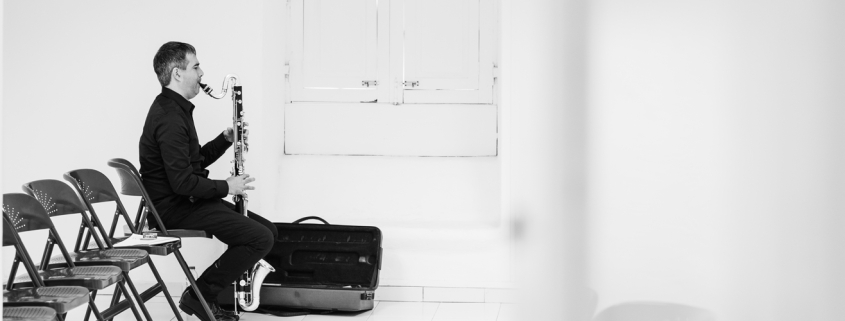


Leave a Reply
Want to join the discussion?Feel free to contribute!